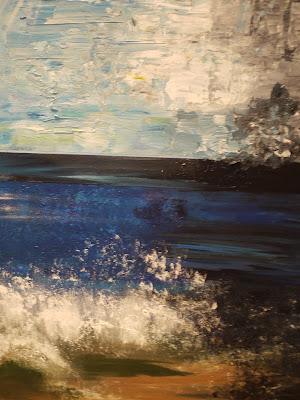Wednesday, October 19, 2011
Cadenzapalooza
I've decided I'm going to add tag-lines at the beginning of these posts, in case that seemed weird. You know, so when I post the link on facebook, the first sentence that shows up under the title isn't about blueberry muffins or something....
So tonight, I finished writing out very nice-looking copies of the first drafts of my first attempts at cadenzas for the Mozart concerto, movements 1 and 2. (I'll write one for 3 in the next few days.) It was actually a lot of fun! I definitely kept in the spirit of the game that I wrote about last entry. At the beginning, I went to Blair in order to finish these cadenzas, work on reeds, and maybe practice a little. Old mindset would have been worrying about reeds while working on the cadenzas and mangling reeds while frustrated I didn't have enough time to practice today. New mindset said I have to write these cadenzas at some point, and if it takes a little longer tonight and I don't get to the oboe, that's OK. Originally I was going to do them over fall break because I "wanted to have a lot of time" to do it, but I've come to realize that isn't the best mentality, and I can do just as good of a job in the middle of a school week as during a four day break. I have to manage time according to quality of product, not quantity.
Well, about the cadenzas! I got the part about deconstructing the themes into motives and piecing them together in interesting ways. And I had a lot of fun snaking around different key areas. The most difficult part for me was writing a "virtuosic" part - basically, interestingly noodley sequences. Noodle, noodle. I asked Professor Ploger about it, and today in Musicianship, we talked a little about sequences. She gave us a Bach Fugue (WTC Eb Major) to analyze and basically suggested that we will learn how to write best from studying fugues and written cadenzas and playing around with it ourselves. So, I actually did give myself the time to just play around with chords and discover things for myself (learning-oriented) instead of allotting time to write the cadenza (product-oriented). This afternoon, before embarking on my cadenza expedition, I analyzed the fugue in great detail - blue for statements of the subject, yellow for countersubject, and then identified how the motivic fragments played themselves out in the episodes (with more colors! Green, orange, purple, grey!). I also did a general harmonic analysis and a very specific one when it came to the sequences. I learned SO much from doing that! The noodley parts in my Mozart cadenzas are very Bach Eb Major Fugue inspired...
The other major difficulty I had was writing the cadenza for the second movement. I found it to be a lot more challenging that for the first movement, primarily because the technique I used to modulate in the first cadenza is inextricably embedded in the melody of the second movement. That doesn't seem to be too clear, I might just end up babbling nonsensically about this...but for example...I want to take the descending motive "la sol fa mi re do#"....well, what exactly do I change? The melody already did a rather suave move from fa major to re harmonic minor. So I ended up with a lot more embellishment, jumping octaves, and less harmonic adventure, but I'm still pleased at how it turned out. The sequence is kinda nifty that I used because I actually come back to sol harmonic minor in a different way than I left it...
So, they aren't masterpieces, of course, but I am so proud that my first attempts turned out so nicely! Can't wait to write the third movement's. I know they'll be good, because I'm looking forward to some ingenious feedback from Professor Ploger and Professor Hauser. Maybe I will show them to Dr. Rose as well...
Thursday, October 13, 2011
The Excerpt Hat and Other Magic Tricks
Tuesday, October 11, 2011
Copycats
Solfège des Solfèges, Miracle of Miracles
Saturday, October 8, 2011
Fall Break




Tuesday, October 4, 2011
Old and New Music
Sunday, October 2, 2011
Catching Up

Monday, August 8, 2011
Saturday, August 6, 2011
Do It Yourself Oboe


Tuesday, August 2, 2011
Winding and Unwinding
Friday, July 29, 2011
IBIL Update
Thursday, July 28, 2011
Meditation on Intonation
Monday, July 25, 2011
Errrr
Saturday, July 23, 2011
Today's Entry
Yesterday's Post (I didn't have internet)
Well, no internet yet tonight, so I won’t be posting this until tomorrow at least.
So I have arrived in Boston! Specifically, Cambridge. I’m here for the International Baroque Institute at Longy (aka IBIL) for the next week.
Tuesday, July 19, 2011
Color and Texture










Monday, July 18, 2011
Geckos and Things

Thursday, July 14, 2011
:P
Epic Eartraining Post, Part 1

So here's something new and interesting. I'm going to blog - as I practice - eartraining.
Tuesday, July 12, 2011
Harnoncourt, Leonhardt, and Acrylics

Today has been quite the fabulous day.
Monday, July 11, 2011
The Ultimate Warm-Up

Sunday, July 10, 2011
Home, Home On The Range

Back in Florida! Finally. After six weeks, it feels very good to be home. I slept 13 hours last night. Haven't done too much today, but have gotten a lot of little things done, like emails and such. I also added some glitz and glam to my metronome. It's pretty snazzy.